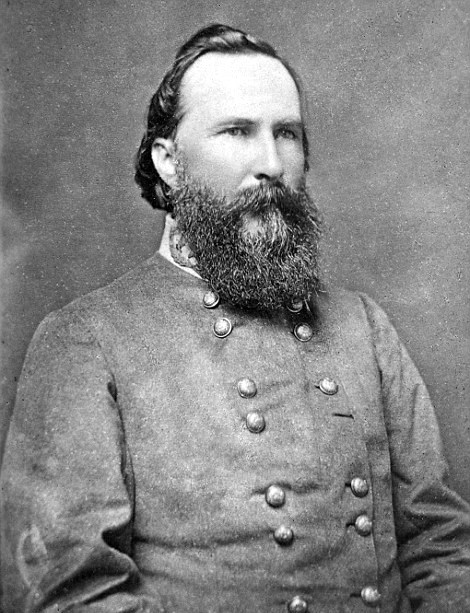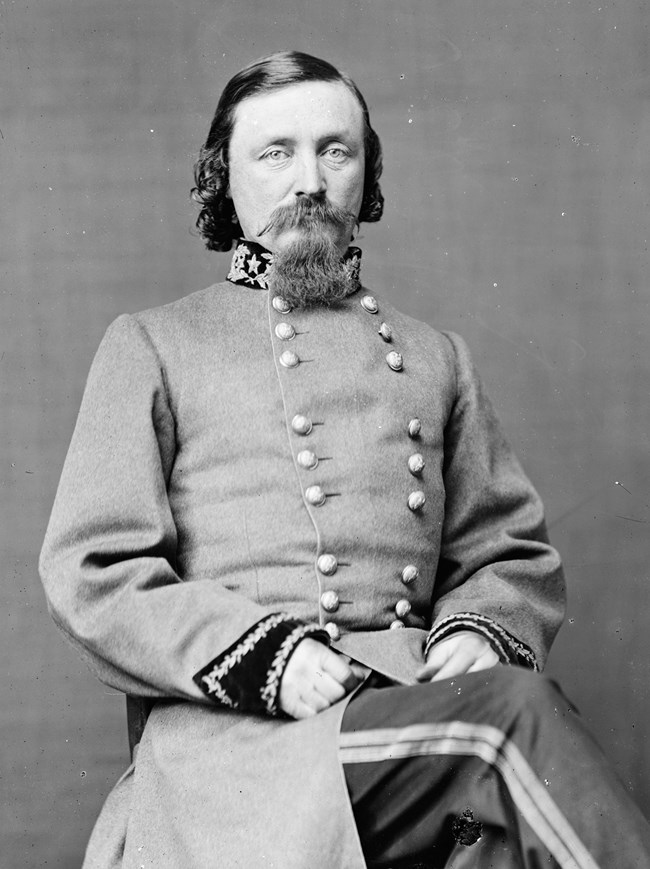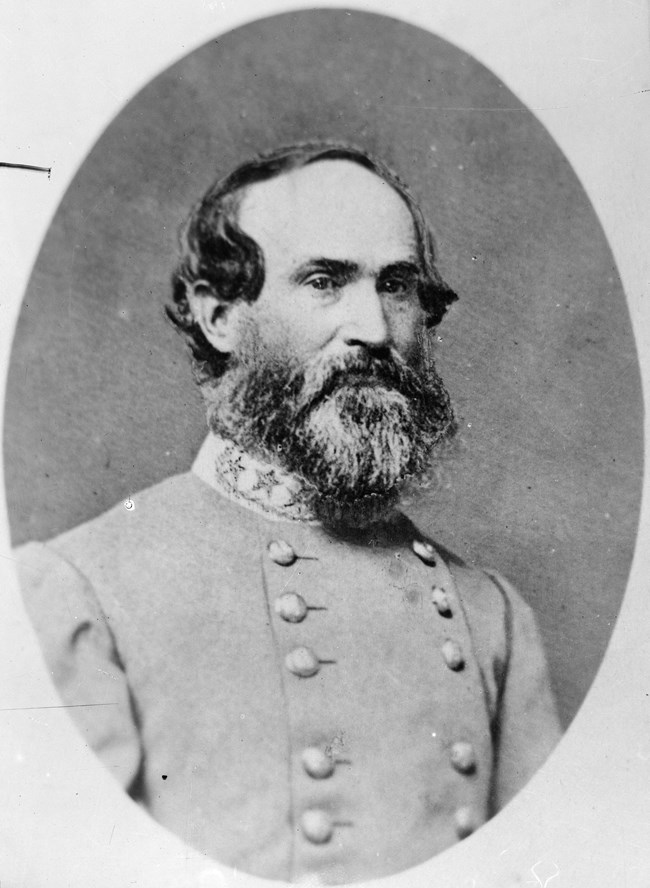Last updated: August 9, 2022
Article
Confederate Commanders at Gettysburg

Published in Confederate Portraits (1914) by Gamaliel Bradford
James Longstreet
The most trusted of Lee's corps commanders, General James Longstreet's troops bore the brunt of the fighting on July 2nd and 3rd at Gettysburg. Longstreet was in charge of the main Confederate attack on the last day of the battle, though he did not believe that the effort would be successful. After the war the Longstreet’s actions during the Battle of Gettysburg became a focal point for military historians who wished to absolve Robert E. Lee of any mismanagement on the battlefield.Richard S. Ewell
Commanding the Second Corps that was once "Stonewall" Jackson's, General Ewell was known as an eccentric man, but brave in battle and admired by his men. At Gettysburg his troops arrived on July 1 in the right place and attacked at the right time. They stampeded Federal troops through Gettysburg and took hundreds of prisoners. Later in the day Ewell received orders to take the Federal position, now on Cemetery Hill, “if practicable.” Ewell’s decision not to take the hill causes much controversy after the war. Like Longstreet, Ewell was a target of Lost Cause authors invested in deflecting blame for the Confederate loss at Gettysburg away from Robert E. Lee.A.P. Hill
Commanding the Third Corps of the Army of Northern Virginia, General Ambrose Powell Hill's troops opened the battle on July 1, 1863. Hill’s troops also fought on July 2, and he sent the better part of two divisions into the grand assault on July 3, that became known as Pickett's Charge. A.P. Hill did not survive the war. He was killed in Virginia barely a week before the Confederate surrender at Appomattox Court House.Henry Heth
Marching from Cashtown, Pennsylvania on the morning of July 1, 1863, General Henry Heth's troops fired the first Confederate shots of the battle. At the height of the fighting that day, he was struck in the head by a minie ball and knocked senseless. Heth was fortunate to recover just in time to lead his command during the retreat back to Virginia. After the war he wrote his memoirs that Lee's army had never been so confident of victory as they were during the Gettysburg Campaign.John Bell Hood
An aggressive commander who hailed from Kentucky, General John Bell Hood commanded a division under General Longstreet. His troops marched 18 miles on July 2, and then attacked Federal troops on Little Round Top and at Devil's Den. Hood was seriously wounded in the arm while leading his troops into battle. Though surgeons did not amputate the shattered limb, it would hang useless by his side for the remainder of his life.
Library of Congress
George E. Pickett
One of the more flamboyant of Lee's generals, General George E. Pickett worried that his division of Virginians would fail to see action during the Gettysburg Campaign. As events turned out, he and his soldiers would be a central park of the most famous action in the battle. Pickett’s name is forever associated with Confederate assault on July 3 that became known as Pickett's Charge.J.E.B. Stuart
Bold and dashing, General James Ewell Brown (sometimes just called Jeb) Stuart was the beau ideal of southern horsemanship. Commanding the cavalry of the Army of Northern Virginia, he directed a successful raid through Maryland and Pennsylvania that ended in controversy when his arrival at Gettysburg came long after the battle had begun, earning him an embarrassing censure from the Robert E. Lee. Stuart's horsemen fought a pitched battle three miles east of Gettysburg on the afternoon of July 3 and he was soundly defeated. Stuart died from wounds received at the Battle of Yellow Tavern in May 1864.John B. Gordon
Commanding a Georgia brigade in Ewell's corps, General John B. Gordon was an experienced soldier who had almost lost his life at the Battle of Antietam in 1862. His troops put many of the Federal troops to flight on July 1after which he occupied the town of Gettysburg and was an interested observer at corps headquarters. Later, Lee assigned Gordon to lead the surrender parade of the Army of Northern Virginia at Appomattox Court House in 1865. After the war, Gordon served several terms as the Governor of Georgia, was an influential leader of The United Confederate Veterans, and in 1904 published his memoir of service, Reminiscences of the Civil War.E.P. Alexander
Colonel Edward Porter Alexander commanded a reserve artillery battalion in Longstreet's Corps. The responsibility of the cannonade prior to Pickett's Charge on July 3rd was placed on his shoulders. It was Alexander who sent the message to General Pickett begging him to advance while his depleted artillery could still support the charge but was frustrated by misplaced ammunition supplies and the overwhelming Federal artillery response. After the war, Alexander wrote extensively about his wartime experiences including his role in the artillery fighting at Gettysburg.Lewis Armistead
Commanding a brigade in Pickett's Division, Brigadier General Lewis Armistead led his troops on foot across nearly a mile of open field and into the Federal line where he was wounded and captured. A career army officer before the war, many of his closest army acquaintances remained loyal to the United States and fought at Gettysburg. He died in a Federal field hospital the day after his wounding.William C. Oates
As colonel of the 15th Alabama Infantry, this former lawyer and outspoken newspaperman found himself and his regiment fighting in some of the roughest terrain on the Gettysburg battlefield. In the bitter contest with the 20th Maine Infantry on the boulder-strewn slope of Little Round Top, Oates lost almost half of his regiment, including his brother numbered among the slain.Eppa Hunton
Leading the 8th Virginia Infantry in Garnett's Brigade, Colonel Eppa Hunton was painfully wounded during Pickett's Charge and his regiment lost its flag to the 16th Vermont Infantry. A brigadier general by war's end, he afterward became a vocal critic of his former division commander and refused to visit the Gettysburg battlefield where he had lost so many of his closest friends.
Library of Congress
